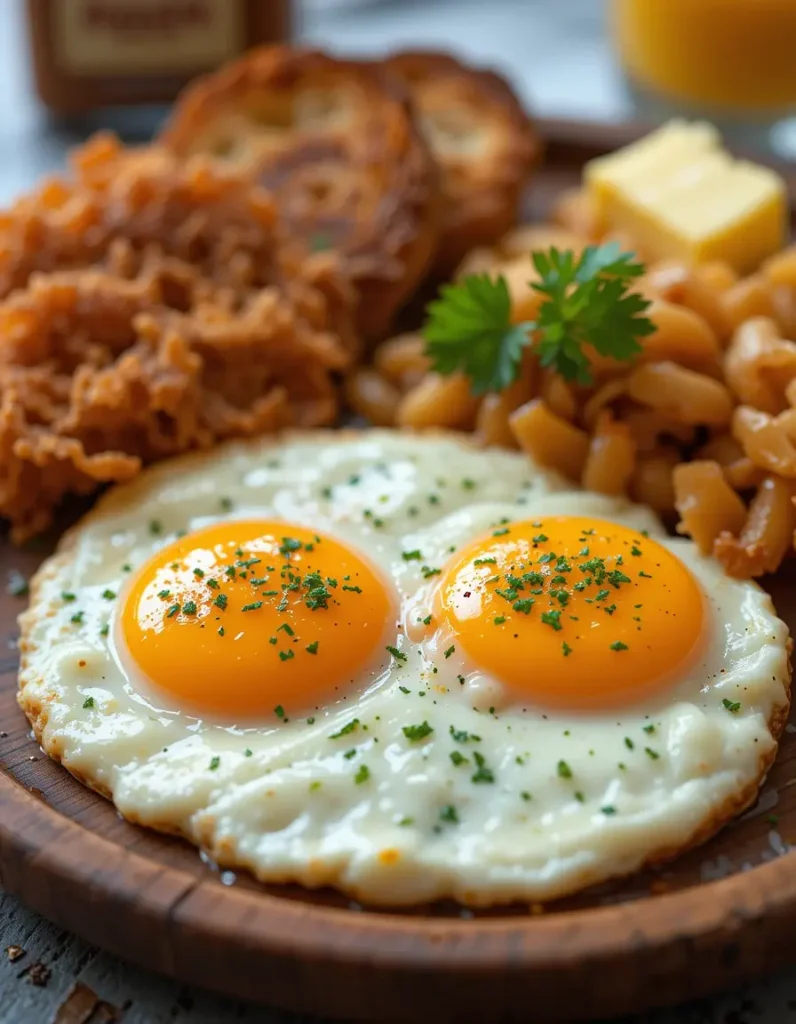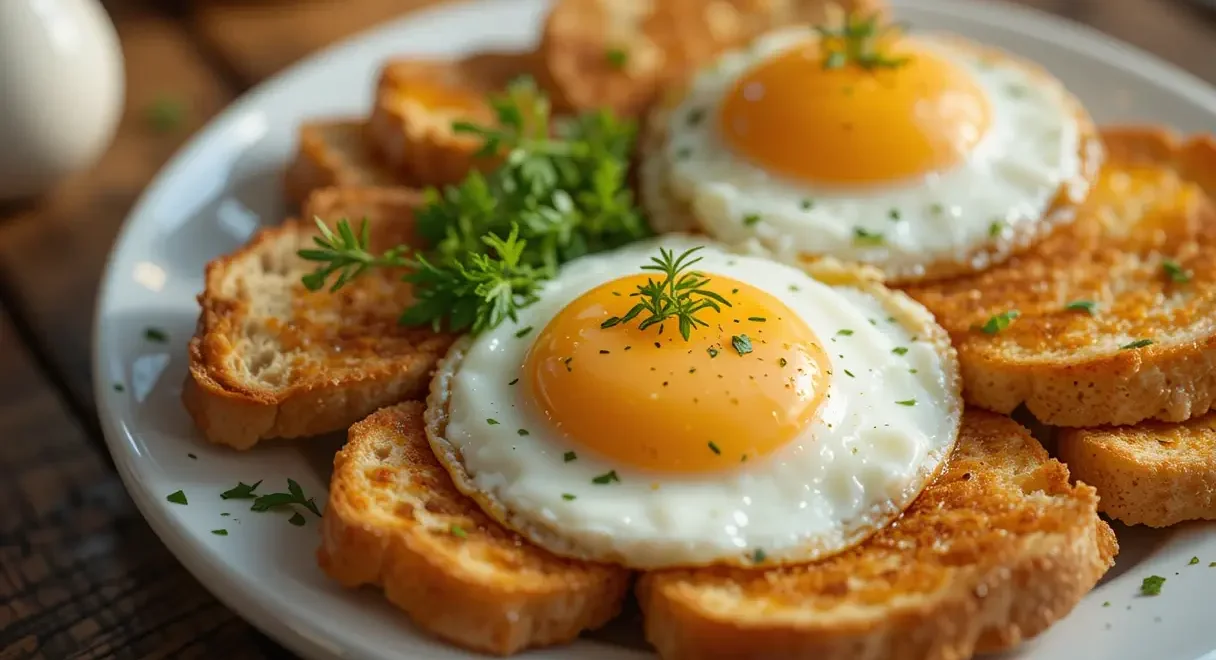Ever wondered why some people prefer their eggs over hard while others can’t live without a runny yolk? Eggs over hard might not steal the spotlight as much as sunny-side-up or scrambled eggs, but they’re an underrated gem in the breakfast world. Whether you’re a pro in the kitchen or just experimenting, learning how to perfect eggs over hard can seriously level up your breakfast game. So, let’s dive in!
“Eggs over hard are the unsung heroes of the breakfast table – reliable, versatile, and downright delicious.”
What Does “Eggs Over Hard” Mean?
First things first, what exactly are eggs over hard? Simply put, these are fried eggs where the yolk is fully cooked through. Unlike over-easy eggs (where the yolk stays runny), over-hard eggs are flipped and cooked until the yolk is firm. Think of them as the neat freak of the egg family – no mess, no fuss, just pure deliciousness. 🥚
Origins of the Cooking Style
The technique of frying eggs has been around for centuries, but eggs over hard gained popularity as a breakfast favorite in the United States. This method ensures that the eggs are fully cooked, making them a safer and more practical option for many. Plus, they pair beautifully with everything from toast to tacos!
The Nutritional Value of Eggs Over Hard
Eggs are often called nature’s multivitamin, and for a good reason! They’re packed with nutrients that keep your body fueled and energized throughout the day. Let’s break it down.
Calories and Macronutrients
| Nutrient | Per Large Egg (50g) |
|---|---|
| Calories | 70 |
| Protein | 6g |
| Fat | 5g |
| Carbohydrates | 0.6g |
As you can see, egg are an excellent source of protein, which is essential for building and repairing muscles. They’re also rich in healthy fats that keep you full and satisfied.
Vitamins and Minerals in Hard-Cooked Eggs
Did you know that eggs are a powerhouse of vitamins and minerals? They’re packed with Vitamin D (great for your bones!), B vitamins (for energy), and even iron. And the best part? Cooking eggs over hard doesn’t significantly reduce these nutrients, so you’re getting the full nutritional punch. 💪
Why Choose Eggs Over Hard?
Okay, so why should you give egg over hard a chance? Here are a few compelling reasons:
Comparing Cooking Styles: Over Easy vs. Over Hard
Over easy eggs are soft and gooey, which some people love. But if you’re someone who doesn’t enjoy runny yolks, over-hard eggs are your best friend. They’re fully cooked, which means you don’t have to worry about yolk spilling all over your plate (or your shirt!).
Benefits of Fully Cooked Yolks
Fully cooked yolks are not only safer (goodbye, salmonella worries!), but they’re also more versatile. You can use eggs over hard in sandwiches, wraps, or salads without worrying about them making a mess. Plus, they’re great for people who prefer a firmer texture. 🥪
Step-by-Step Guide to Cooking Egg Over Hard
Ready to try making egg over hard at home? Here’s a foolproof guide to help you nail it every time. Trust me, it’s easier than you think!
Essential Tools and Ingredients
| Item | Quantity |
|---|---|
| Eggs | 2 large |
| Butter or Oil | 1 tsp |
| Salt and Pepper | To taste |
Preparing the Pan: The Key to Success
Start by heating a non-stick pan over medium heat. Add a small amount of butter or oil and let it melt, ensuring the entire surface is coated. A well-prepped pan is the secret to egg that don’t stick!
Cooking Technique for Perfect Eggs Over Hard
- Crack the eggs gently into the pan, keeping the yolks intact.
- Cook the eggs until the whites are set and opaque. This usually takes about 2-3 minutes.
- Flip the eggs carefully using a spatula. (Pro tip: Tilt the pan slightly to make flipping easier.)
- Cook for another 1-2 minutes, or until the yolks are fully cooked through.
And voilà! Your eggs over hard are ready to enjoy. 🎉
Troubleshooting Common Cooking Issues
Even the best cooks face hiccups now and then. If your egg stick to the pan, make sure you’re using enough oil or butter. If the yolks break, try flipping them more gently next time. Practice makes perfect!
Common Problems and Their Solutions
Even though egg over hard are straightforward to cook, things can go sideways if you’re not careful. Let’s tackle some common problems and how to fix them like a pro. 🧑🍳
Sticky Eggs: How to Prevent Them
Ever had your eggs glued to the pan? It’s frustrating! Sticky egg usually happen when the pan isn’t hot enough or lacks enough fat. To fix this, always preheat your pan over medium heat before adding butter or oil. Also, use a non-stick pan for hassle-free cooking.
“When in doubt, add a little extra butter. It’s the magic glue that keeps your eggs happy!”
Overcooking and Rubberiness: Tips to Avoid
No one likes rubbery egg! Overcooking happens when you leave the eggs on the heat for too long. Keep an eye on them and remove them from the pan as soon as the yolks are firm. Timing is everything—set a timer if you have to!
Cracking Yolks: Keeping Them Intact
Flipping egg can feel like a circus act, but it doesn’t have to be. To avoid cracking the yolk, use a wide, flat spatula and slide it gently under the eggs. Tilt the pan slightly to help with flipping, and keep your movements slow and steady.
Creative Ways to Serve Eggs Over Hard

Think egg over hard is boring? Think again! They’re incredibly versatile and can be used in tons of creative dishes. Here are some ideas to inspire you:
Classic Breakfast Combos
Let’s start with the basics. Serve your eggs over hard with crispy bacon, buttered toast, and a side of hash browns. It’s a classic combo that never goes out of style. Add a splash of hot sauce if you’re feeling adventurous! 🌶️
Eggs Over Hard in Sandwiches and Wraps
These eggs are perfect for sandwiches because they’re mess-free. Layer them with cheese, avocado, and your favorite veggies between two slices of bread. Or roll them up in a tortilla for a quick breakfast wrap. 🥑🥪
Pairing Eggs Over Hard with International Cuisines
Feeling fancy? Pair your egg over hard with international flavors. Add them to a bowl of fried rice for a Chinese-inspired dish or use them to top a spicy shakshuka. The options are endless, and your taste buds will thank you!
The Science Behind Cooking Eggs Over Hard
Let’s get a bit geeky for a moment. Cooking egg is more than just tossing them on a pan—it’s a fascinating science experiment happening right in your kitchen.
What Happens During Cooking?
When you cook an egg, the heat causes its proteins to denature, or unravel, and then reattach in a different structure. This is what turns the egg from a liquid to a solid. Cool, right?
How Heat Affects Protein Structure
The trick to perfect egg over hard is controlling the heat. Too much heat can cause the proteins to tighten too much, resulting in rubbery eggs. Moderate heat ensures the proteins set gently, giving you tender whites and a firm yolk. 🔬
Popular Variations of Eggs Over Hard
Even within the realm of egg over hard, there’s room to get creative. Here are some popular variations you can try:
Spiced and Seasoned Egg
Plain eggs are great, but a little seasoning can go a long way. Sprinkle your egg with paprika, garlic powder, or a pinch of cayenne for extra flavor. Or go wild with some everything bagel seasoning—trust me, it’s a game-changer!
Low-Fat Cooking Techniques
If you’re watching your fat intake, skip the butter and use a non-stick spray or a well-seasoned cast iron pan. You can also poach your eggs for a lower-calorie option, though they won’t technically be “over hard.”
FAQs
Still have questions? Let’s clear up some common doubts about cooking and enjoying egg over hard.
Are Eggs Over Hard Safe to Eat?
Absolutely! In fact, they’re one of the safest ways to enjoy egg since the yolk is fully cooked, reducing the risk of foodborne illnesses. Great for kids and anyone with a compromised immune system.
Can You Reheat Egg Over Hard?
Yes, but be careful. Reheating egg can make them rubbery if not done right. Use a microwave at 50% power for a few seconds or warm them gently in a pan over low heat.
Last Bite
So there you have it—everything you need to know about mastering egg over hard. Whether you’re a breakfast enthusiast or just looking for a quick protein boost, this cooking style has something for everyone. Remember, practice makes perfect, so don’t be afraid to crack a few eggs along the way. Happy cooking! 🍳
“Egg over hard: simple to cook, delicious to eat, and always a crowd-pleaser.”
People also ask:
What Does “Egg Over Hard” Mean?
“Eggs over hard” refers to a style of fried egg where both the whites and the yolks are fully cooked. After cooking the egg on one side until the whites are set, the egg is flipped and cooked further until the yolk becomes firm and solid. Unlike “over easy” or “over medium” eggs, where the yolk remains runny or semi-runny, over hard eggs have no liquid yolk remaining. They’re great for those who prefer a fully cooked texture or want mess-free eggs for sandwiches or wraps. 🥚
What Are the Four Types of Fried Eggs?
The four main types of fried eggs are distinguished by how the yolks are cooked:
- Sunny-Side Up
The egg is cooked on one side only, leaving the yolk runny and the whites mostly set but slightly soft around the edges. The yolk remains visible and unflipped, like the sun in the sky. ☀️ - Over Easy
The egg is flipped once and cooked briefly, so the yolk remains runny. The whites are set but still tender, making this a favorite for dipping toast. - Over Medium
Similar to over easy, but the egg is cooked a bit longer after flipping. This results in a yolk that is partially set, with a slightly creamy texture. - Over Hard
The egg is flipped and cooked until the yolk is fully cooked through and firm. It’s a great choice for those who prefer their egg without any runny yolk. 🍳
Do You Break the Yolk for Over Hard Egg?
No, you don’t typically break the yolk for over hard egg. The goal is to cook the yolk completely while keeping it intact. However, if you prefer a different texture or are using the egg as a sandwich filler, you can gently pierce the yolk before flipping to ensure it spreads and cooks evenly. It all depends on your personal preference and how you plan to use the eggs! 😊

